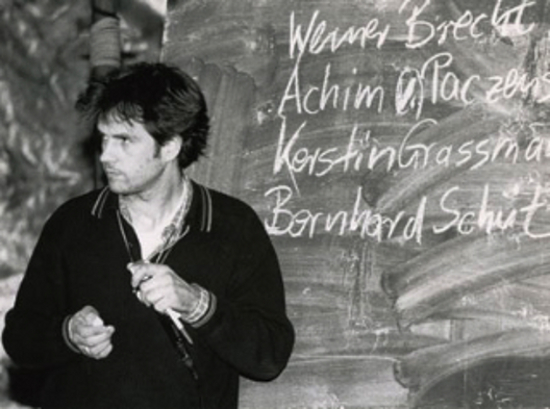Wie wird deutschsprachige Literatur und Kunst eigentlich im Ausland aufgenommen? CULTurMAG wirft einen ungewöhnlichen Blick auf einheimische Autoren und Künstler. Lucy Renner Jones (übersetzt u.a. deutschsprachige Literatur ins Englische) betrachtet in unregelmäßigen Abständen interessante Werke in Hinblick auf ein mögliches Interesse des englischsprachigen Auslands. Diesmal hat Sie sich mit Christoph Schlingensiefs Hörbuch „Ich weiß, ich war’s“ beschäftigt.
Angry Sprechtheater in a box
Some time ago in Berlin, there was anger. There was fury, gall, and rancour, spleens vented, sabres rattled, stages stamped on in Brecht’s footprints and staccato slogans shouted in time with your feet. There was water cannon and rioting, fake police hats, real megaphones and solidarity. In the old days, everyone got angry together. It didn’t matter where your anger came from, you could always find someone to share it with. You could drink beer in angry bars, watch angry theatre, or discuss angry films.
Then anger was replaced by all-year round beer gardens, cheap flights to Vilnius, Rome or Stockholm based on whim not political conviction, and sabres were traded in for Nordic walking sticks because walking is good for you and sabre-rattling raises your blood pressure. Things gentrified and ossified.
Schlingensief was an angry figure on the German art scene, and his death has left a hole that no one artist can truly fill. This becomes clear early on in Ich weiß, ich war’s, (I Know It Was Me) a four-hour audio book whose very breathlessness makes it alive. Schlingensief’s associative monologues blast the listener with emotional energy – passion and outrage in full tilt towards fury. It’s a virtuoso performance, Sprechtheater in a box.
Wer macht’s?
Young Schlingensief was a film aficionado, making his first super-8 films with local Oberhausen neighbours, including Helge Schneider. But we don’t hear about this until CD 4. The audio book is not chronologically arranged, it is a fragmented series of controlled explosions spliced together. Sometimes you wince as a listener. Sometimes you crease up with laughter. Some stories have you stopping and replaying to make sure you’ve understood properly. Nearly all of it is riveting. By the end, I felt as if I had learnt Schlingensief’s verbal tics, and probably deliberate obfuscations (did he say “wer macht’s” or “Wehrmacht”?) and realised what a talented actor, brilliant raconteur, and uncompromising, furious person he was.
The crucial part of Schlingensief’s biography, we learn, began when he moved in with the experimental German film-maker Werner Nekes, and did a three-year apprenticeship that saved him from the mainstream – “where films have endings, and so on”. Nekes told him he should start films at the end if he wanted to. Fittingly, the audio book starts at the end of Schlingensief’s life too. The actor Martin Wuttke begins by reading Schlingensief’s online response to an article in Der Freitag on 3.09.2009, “Wer hat geil Krebs?” In it, journalist Michael Angele complains about a wave of confessional literature – including Schlingensief’s Ich weiß, ich war’s – in which writers subject us to their stories of cancer. Accusing them of exhibitionism, Angele asks sanctimoniously if it wouldn’t show true greatness to simply keep quiet. Schlingensief’s vitriolic response (“…so ein Dreck schreibt also der Freitag…”) can be savoured in full at freitag.de.
Giving the faceless a name
But making socially marginalised groups visible was not some hare-brained scheme that occurred to Schlingensief when he was dying, it was one of his lifelong obsessions. His aim was to bring art out of theatres and cinemas, destroy the illusion of narratives and ready answers, and confront people with harsh realities. My first live encounter with him was a performance of 7 Tage Notruf für Deutschland in 1997 at the Deutsches Schauspielhaus in Hamburg, in which the audience was not allowed to sit back in comfy chairs but was marched by Schlingensief (with a megaphone in fake police gear) to Hamburg town hall, where he stood under the mayor’s window and demanded answers to Hamburg’s homeless policy, before marching back to the Bahnhofsmission where he and his actors had set up camp with prostitutes, junkies, and the homeless. Quite a few people left early.
Over his lifetime, he challenged political decisions made in Germany and Austria (Scheitern als Chance, Passion Impossible), lent a voice in Germany to the unemployed (Chance 2000), the disabled and the persecuted (Ausländer raus!), and finally turned his attention to Africa (Operndorf Afrika). One campaign that took place during Chance 2000 resulted from a simple question Schlingensief posed: where were the 6 million unemployed cited every day in the newspapers? How could they be made more visible? Schlingensief conjured up a metaphor to raise this profile of this dispossessed group – a collective jump into Lake Wolfgang next Helmut Kohl’s holiday villa to produce a wave that would wash the Chancellor away. Despite his deliberate over-extension of the metaphor, the German secret service took Schlingensief seriously and chased him back to shore in motorboats. Similarly, Schlingensief dumped a few kilos of rotten fish in Jürgen Möllemann’s front garden, performed voodoo with a hen and tinkered on a piano full of washing powder in protest against anti-Semitic statements made by the FDP.
Germany dismembered
In nearly all his tirades, Schlingensief verbally dismembers what he sees as hypocritical and smug elements of German society, whether it’s over-indulgent Prenzlauer Berg parents or institutions like the Bayreuth Festspiele, which he condemns as a fascist undertaking. It’s not so much Germany on the couch; it’s Germany on the dissecting table. He uses his voice as a scalpel. But in the audio book, you’re able to catch the humour in his voice, without which he could be accused of downright self-righteousness. He was often suspected of exploitation, especially in the case of his troupe of disabled actors. But when he recounts how Werner Brecht, an amateur actor with sleeping sickness, would be left to snooze for an hour on stage during live performances while images of tornados and other natural disasters were projected to keep the audience entertained, it’s hard to see where exploitation comes into it.
Werner, Achim, Axel – these were people with names. And no, they didn’t represent The Disabled – they were individuals. And some of them needed to sleep on stage. This consideration was later mirrored in Schlingensief’s decision to leave gaps where Alfred Edel, one of his lead actors who died during the Chance 2000 campaign, was supposed to come onto the stage. The gaps marked the pain. He wanted to highlight frailty and loss, not mask it. “Those who are totally in control,” says Schlingensief with great conviction, “are the next ones who will become ill.” Schlingensief talks about what it means to be dying in an aggressively healthy society. What about the sick? Where should they go? The Opera Village in Burkina Faso was not conceived as a Third World version of Bayreuth. Its central purpose for Schlingensief was to restore music to its original purpose: catharsis. The main feature of the Opera Village should be the infirmary, not the snail-formed amphitheatre. Music, or equally the sound of football being played, was to have the function of soothing patients, not entertaining the elite.
Lebenskunstwerk
What slim chance is there that the audio book will be reproduced in English? Though he said of himself that he was “very German in many ways”, Schlingensief’s notion of integrating art into life may have been better appreciated abroad. As Marion Löhndorf pointed out in her excellent article:
“There is a constant factor throughout Schlingensief’s productions, which makes talk of a „Lebenskunstwerk’ (‘work of life art’), in the sense of art intervening in life, not that outlandish at all.” (read more)
His status remains, or has even grown since his death, as an artist who made a breakthrough. Not a flash in the pan but a lasting movement. Though not all press coverage of him abroad was good, he always made headlines. People were interested in what he had to say, and rightly so. As Roland Koberg put it:
“In Berlin, you might find yourself at a party in the middle of a dying conversation, and the mention of Schlingensief will jolt everyone back to life.” (read more)
And that is precisely what happens with this audio book: He jolts you out of apathy, back to life. So my tip for publishers would be: record it as an audio book. Ask Tilda Swinton to narrate it. Let’s bring back anger! Let start rattling sabres!
Lucy Renner Jones
Christoph Schlingensief: Ich weiß, ich war’s
. Mit Martin Wuttke. Herausgegeben von Aino Laberenz. Roof Music 2012. 4 Stunden 39 Minuten. 19,99 Euro.
Als Buch erschienen bei Kipenheuer & Witsch 2012. 304 Seiten. 19,99 Euro.
Zur Webseite schlingensief.com












